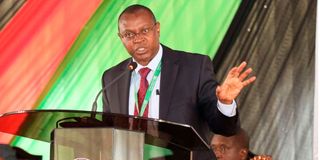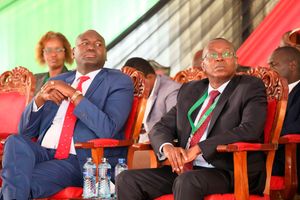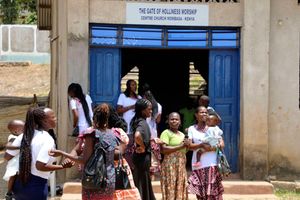
Kenya National Examinations Council (Knec) CEO David Njeng'ere addresses participants during the launch of the Educational Assessment Resource Centre at New Mitihani House, Nairobi on July 4, 2025.
The government has launched a pilot programme to digitally verify certificates issued by the Kenya National Examinations Council (Knec), beginning with the Public Service Commission (PSC). This initiative is intended to combat forgery within the civil service.
This comes amid mounting concerns about fake academic documents, particularly among individuals seeking employment or promotions within the public sector.
During the official launch of the Educational Assessment Resource Centre (EARC) at the Knec headquarters in Nairobi, Dr Julius Bitok, the Principal Secretary for Basic Education, announced that the digital verification platform would allow government institutions and private sector organisations to validate academic credentials quickly and easily, eliminating the need for paperwork or physical visits.
“We are starting with a pilot at the Public Service Commission targeting public servants. The next phase will involve the Ministry of Interior before we expand to cover the entire government and the private sector,” said Dr Bitok.
The digital platform is expected to enhance transparency, eliminate human interference and reduce the time taken to authenticate certificates.
“I'm happy to inform the country that Knec has gone digital on certificate verification, be it Kenya Certificate of Primary Education, Kenya Certificate of Secondary Education or any other papers issued by the council.”
The launch of the EARC is a significant milestone in the implementation of Competency-Based Education (CBE) reforms, focusing on a more holistic approach to assessing learners.
The PS emphasised that the government is shifting from a rigid, exam-based evaluation model to one that considers talents and co-curricular and extra-curricular capabilities.
“We want to capture performance in various facets, not just in written examinations, and that’s why this centre is very important. It’s about transforming assessment to enhance education with a focus on quality, equity and inclusion,” he said.
Knec chief executive David Njeng’ere said that the new centre will play a critical role in building teachers' capacity to implement CBE effectively, particularly during the country's transition from junior to senior school.
“The centre will provide several capacity building and professional development courses in Competency Based Assessments targeting practitioners in Assessment institutions, school leaders, teachers, parents, quality assurance officers and all other persons involved in the assessment ecosystem,” he said.
In preparation for the 2025 transition of Grade 9 students to senior secondary school, the government has put in place a comprehensive support plan for learners.
All 1.2 million Grade 9 students have already selected their preferred senior schools, which are categorised into Clusters 1 through 4. Placement will follow the national assessments scheduled for November.
Dr Bitok revealed that the government plans to construct 1,600 science laboratories across the country over the next six months, primarily in newly established and day secondary schools.
“The 1,600 labs will support schools to implement the three senior school pathways—STEM, Arts and Sports Science, and Social Sciences. Construction will commence in the next two to three weeks,” he said.
The PS confirmed that the majority of schools are ready to adopt the pathways model and that the government has allocated resources to facilitate a seamless transition for all learners.






